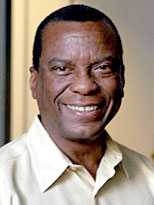Dean for Graduate Students Isaac Colbert has announced that he plans to retire in June 2007, concluding three decades of achievement in Institute administration. Since being appointed dean in 1999, Colbert has led efforts to develop MIT's graduate community through such innovative programs as the Graduate Student Life Grants.
"Dean Colbert has developed and sustained a strong network of colleagues in a variety of offices around MIT who are committed to graduate students. He has passed his enthusiasm on to countless colleagues who did not realize they were part of the graduate commons," said MIT Chancellor Phillip Clay. "A champion for diversity and inclusion, he has also served as a bridge between faculty and students caught in difficult situations."
Colbert has served a number of different roles at MIT, starting as a consultant in human resources and eventually being named dean in 1999. "I thought MIT would chew me up and spit me out and now, 30 years later, they are still chewing," Colbert said last week in his expansive office overlooking Killian Court.
Though Colbert had not expected to spend so much of his life at the Institute, he knew soon after starting here that he had found a place where he belonged. "This was a place that fit my own style and characteristics as a risk taker and someone with a vision of things to do and how to get them done," Colbert said.
Colbert came to MIT in 1977 as a senior consultant and trainer in human resources, which was then called the Office of Personnel Development. Since then he has held a number of positions at MIT, including serving as the manager of faculty and staff information services from 1981 to 1985. From 1986 to 1988, he worked as the assistant to the vice president for financial operations, during which time he reorganized the process by which strategic administrative computing systems were acquired.
Colbert, 60, earned his bachelor's degree in experimental psychology from the John Hopkins University in Baltimore, MD, where he grew up. He earned both his M.A. in experimental psychology, primate learning and behavior and his Ph.D. in experimental psychology, human learning and cognition from Brown University.
These psychology skills came in handy during his time in the Graduate Students Office, where he started as associate dean in 1988. Colbert said he found an office that was "drowning in paper. My immediate goal was to make it more student centered than paper centered."
One of the main complaints Colbert said he heard from graduate students was that there was no sense of community. After being named dean in 1999, Colbert committed to changing that. Over the years, he has implemented more social opportunity and campaigned for better on-campus housing for graduate students. Colbert also focused his attention on graduate school alumni and alumnae, whose potential contributions to the current graduate community were, he felt, being neglected.
With the help of the Alumni Office, Colbert called a meeting in Hong Kong with MIT graduate alumni to gauge their level of commitment to the concept of graduate student community. "I would have been happy if 10 people had shown up," he said. "But I walked into a conference room jammed with people." As a result of the meeting, graduate alumni have been more in touch with the Institute, the focus of more attention by the Institute, and strongly supportive of improving graduate life.
Over the years, the close relationships he has formed with faculty and students have become the most important part of his work, Colbert said. He is pleased with what he has accomplished at MIT. "Today the idea of graduate student life is not the oxymoron it was less than a decade ago," he said.Â
"Ike (Colbert) has set a standard of caring that we hope to find in our next dean of graduate students," Clay said.
After retiring in June, Colbert said he plans to focus on his start-up business ventures. "Life has various stages and I'm eager to see what the next one holds in store for me," he said. "It is time to hand my work off to another generation of leadership."
A version of this article appeared in MIT Tech Talk on January 10, 2007 (download PDF).






